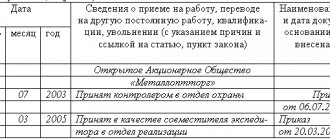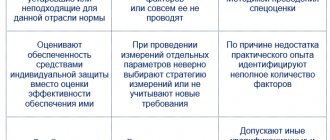Goals of state examination of working conditions
The procedure is carried out for the purpose of supervising the activities of organizations and is carried out by federal executive authorities that have the required powers.
The algorithm and rules for conducting state labor examination are regulated by the provisions of the order of the Ministry of Labor, issued in August 2014 under number 549n. The objectives of a special assessment of working conditions are to control:
- qualifications of employees regarding working conditions after recertification in the workplace;
- compliance by the manager with the rules for payments and accrual of monetary guarantees and compensation for employment with harmful and/or dangerous factors that have a direct impact on human health or pose a possible threat to it;
- compliance of constructed facilities, introduced technologies, modernization of existing equipment, production, etc. labor safety standards;
- working conditions (including periods before the occurrence of an emergency or accident), etc.
These are the main goals of the state examination of working conditions, however, the list can be changed and supplemented.
The state examination can be carried out either at the request of the employer or employees, or on the own initiative of control and supervisory institutions.
Purposes of the audit
The main task of specialists is to check whether the organization complies with Federal Law No. 426, which has been in force in Russia since 2013. The law clearly states what conditions the employer must create for employees, what and for what remuneration and compensation are provided.
The purposes of this check are:
- Defend the right of every working citizen to safe work.
- Monitor how labor safety standards are observed, whether employee certification is carried out efficiently, and whether payments for work in conditions that deviate from normal conditions (presence of unfavorable factors) are calculated correctly.
- Make a proposal to classify the company as a pro-free company.
- Prepare an opinion for the court on the need to liquidate a company or division after violations have been recorded.
In what cases is state examination required?
There are many reasons why a state assessment of working conditions at an enterprise may be carried out. The main ones are to check:
- quality control of the influence of harmful and dangerous factors on working conditions and the implementation of measures to reduce personnel risks;
- respect for the rights and guarantees of the organization’s employees;
- quality of equipment, its integrity, etc.
Specific situations requiring mandatory conduct of the described research depend on the type of activity of the organization, its status, the initiator, etc.
Who certifies production safety
Technology certification is necessary for organizations that care about their business reputation and want to have official confirmation that production at their enterprise meets safety standards. Such a document is a significant competitive advantage of an enterprise, including when participating in competitions for government contracts or in large commercial tenders.
Applicants for conformity assessment work in the field of occupational safety are organizations that develop, implement and replicate technologies that are capable of monitoring their compliance with a certified technological process, and organizations that have implemented a certain production method. The applicant organization must have an implemented and operating occupational safety management system.
Who is authorized to carry out the examination?
Services for state examination of working conditions can be provided by various institutions. The following have the necessary powers:
- Labour Inspectorate;
- industrial supervision – in the field of enterprises working with chemical or metallurgical products;
- Energonadzor – when inspecting companies involved in the extraction of energy resources;
- Atomic supervision is relevant for enterprises whose activities are directly related to nuclear energy and nuclear materials;
- Sanitary and epidemiological supervision;
- regional-level institutions with powers in the matter of such inspections (full names differ in the constituent entities of the country).
The examination period is limited. The period of implementation is 30 calendar days from the date of approval of the request. If necessary, the time period can be extended by a maximum of 60 days.
The legislation of the Russian Federation identifies the main responsibilities of control and supervisory institutions. These include:
- drawing up a reporting document on the results of the inspection;
- ensuring objectivity and validity of the final results;
- ensuring the integrity of documentation accepted for research from the enterprise;
- ensuring the confidentiality of information obtained during the inspection.
Responsible persons authorized to perform the audit have the right to demand the documentation necessary for the implementation of the procedure free of charge. In addition, they are given the opportunity to carry out various observations, measurements, calculations, etc., necessary to complete the assigned tasks. The head of the organization being inspected does not have the right to refuse them this.
Reasons for refusal to provide public services
In accordance with paragraph 27 of the Administrative Regulations, the law does not provide grounds for refusal to accept documents necessary for conducting an examination of working conditions. At the same time, certain grounds are allowed for suspension or refusal to provide public services. At the same time, suspension of a public service is possible if an incomplete set of documents submitted by the employer is provided, provided that they can be additionally requested from the applicant. The provision of services may be refused if:
- the application does not contain the information required by paragraph 20 of the Administrative Regulations;
- the application was received from a person not included in the circle of applicants provided for in paragraph 2 of the regulations;
- failure by the applicant to submit the documents specified in paragraph 21 of the regulations;
- providing false documents or knowingly false information.
Grounds for conducting state examination
The grounds for carrying out the procedure depend on the person who initiated the process. The employing organization may apply for it for the following reasons:
- The need to reduce spending of funds aimed at accruing required compensation and guarantees to personnel. Initiating an audit for this reason is possible if the head of the enterprise believes that the existing benefits at the enterprise do not comply with the standards provided for by labor legislation.
- Disagreement with the results of a study of the quality of work and qualifications of any official in the company.
The staff or workers' union in most cases initiates a state inspection on the following grounds:
- non-compliance of existing working conditions with the standards provided for by the Labor Code and other legislative acts;
- non-compliance with social and labor guarantees or their failure to provide.
The executive authorities themselves may begin an inspection for the following reasons:
- upon discovery of a fact of non-compliance by the organization with the norms of operating conditions in the process of interaction with other government agencies;
- upon discovery of a fact of non-payment or incorrect calculation of insurance contributions by the employer for its employees to the Pension Fund and the Social Insurance Fund.
If the initiator of the examination is not the organization itself or its employees, the body authorized to carry out the examination is not obliged to notify the company's management of the upcoming examination in advance.
What can the Ministry of Labor do regarding work safety?
The Russian Ministry of Labor belongs to the federal executive authorities. The Government of the Russian Federation instructed him to develop, implement and oversee the implementation of:
1) procedures for: • assigning compensation payments to workers who work in conditions harmful to health, calculating the amounts of these payments; • implementation of state examination of technical specifications; • training in occupational health and safety for blue-collar workers and engineering professionals; • determination of pro-risk levels; • NS and PP investigations;
2) standard instructions;
3) lists of: • factors for work under which workers are entitled to receive milk; • annual health and safety activities (typical); • work that cannot be performed by women or persons under 18 years of age; • services that can only be performed by accredited organizations;
4) standards according to which: • milk is issued or compensation is paid for it, detergents, disinfectants, work clothes, safety shoes, PPE are issued; • the movement of heavy objects by persons under 18 years of age and women is organized;
5) rules: • safe organization of different types and categories of work; • financial support for labor protection measures, treatment of workers in sanatoriums and resorts in the country;
6) criteria for assessing an employee’s ability to work after an injury or illness;
7) rehabilitation programs for persons injured or ill while performing work assignments.
Order of conduct
The procedure for conducting a state examination of working conditions obliges the head of the company to provide the supervisory authority with basic documentation about the enterprise and its personnel. The list of papers subject to verification includes:
- job descriptions;
- a list of positions in the organization whose duties are directly related to dangerous or harmful working conditions;
- reporting on personnel undergoing medical examinations;
- reporting confirming the availability of protective equipment and their mention in personnel files;
- training logs;
- layout of employees during production;
- copies of documents on advanced training of employees and their admission to perform their duties;
- various orders and other local regulations on appointing employees responsible for conducting training.
All documentation must be available at the enterprise and provided to control and supervisory authorities upon request.
You may be interested in: Classification of working conditions according to working environment factors
The basic rules by which studies are most often conducted oblige companies to independently pay the costs of the audit. However, there are some exceptions. In particular, the company is exempt from paying for the work of experts when the initiator of the study is the control and supervisory institution itself.
Procedure for examination
An application must be made.
The total period of the study is one month. When this time is not enough, it is allowed to increase this period, but not by more than two months.
If the initiator of the study of labor conditions is not an authorized body, it is necessary to send a written application.
The document must contain the following information:
- The name of the applicant or his full name;
- Address of the location of the enterprise, or residence of an individual;
- Name of the object of the research being carried out;
- Information about examinations carried out previously (if they were carried out);
- Information about the person’s employment and position;
- Information about payment for the examination (when necessary).
If an employer applies for compensation and guarantees, the following information is provided:
- reports containing data on previously conducted special assessments of working conditions;
- agreements with the representative body of employees, collective agreements in force at the enterprise;
- labor agreement between a specific employee and the organization;
- list of persons who undergo medical commissions;
- conclusions on medical commissions performed (only copies are provided);
- documents accepted by the enterprise at the local level;
- When submitting documents in electronic form, they must be provided with an electronic digital signature.
Please note that today it is possible to submit an application using the State Services portal. If you submit an application using the electronic service, you can track the progress of administrative procedures in relation to the submitted application.
If the research is carried out on a reimbursable basis, then payment must be made before submitting an application.
When it is necessary to study harmful factors, payment for laboratories is made within 10 days from the date of receipt of notification from the official.
Please note that if payment is not made in the manner and on time as established, the official has grounds to refuse to conduct the study.
The submitted document must be registered. Its consideration must be carried out no later than 10 days from the date of its acceptance and registration.
Review results
Several options after reviewing the application.
After reviewing the information provided, one of the following decisions is made:
- conducting research;
- refusal to carry out the examination.
The decision to refuse is made if the following circumstances exist:
- Failure to provide all required data;
- Failure to provide additional information or documents when conducting research without them is not possible;
- Entering false information or submitting false documents.
When the result of consideration of a submitted application is a decision to conduct a study, its organization is carried out by an expert alone or by an expert commission.







